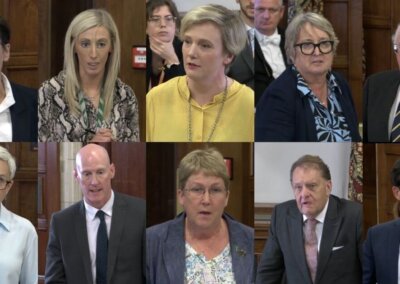The campaign group against sex-selective abortion, Stop Gendercide, has raised concerns that pro-abortion amendments to a Government Bill would make sex-selective abortions legal in England and Wales.
Ahead of a vote on amendments introduced by Stella Creasy MP and Diana Johnson MP to the Criminal Justice Bill that would make extreme changes to abortion laws, Stop Gendercide have said that this proposed amendment “would likely lead to a significant increase in sex-selective abortions taking place here in the UK”.
At present, the Government maintains that, under our current legislation, abortion on the grounds of the sex of the baby is illegal because it is “not one of the lawful grounds for termination of pregnancy” set out in the Abortion Act (which stipulates that abortion can only be performed under specific grounds).
Extreme abortion amendments would make sex-selective abortion legal in the UK
However, Diana Johnson’s amendment (NC1) would remove offences that make it illegal for a woman to perform her own abortion at any point right through to birth.
The explanatory note to Johnson’s amendment confirms that it applies at any gestation, which would mean a woman could perform her own abortion on sex-selective grounds throughout all nine months of pregnancy.
The amendment does not outline circumstances in which it would continue to be an offence for a woman to perform her own abortion – the changes to the law would apply throughout all nine months of pregnancy and would not exclude sex-selective abortions.
By amending the abortion law in this way, self-abortions will, de facto, become possible up to birth for any reason including abortions for sex-selective purposes, as women could mislead abortion providers about their gestational age (as in the case of Carla Foster, who pretended to be 7 weeks pregnant but took pills at 32-34 weeks gestation).
Under Stella Creasy’s amendment (NC40), the Abortion Act and the grounds under which abortion is permitted would be made redundant up to 24 weeks, allowing abortion on demand, for any reason, including sex-selective abortion.
Sex-selective abortion would be available on-demand through to 24 weeks.
Evidence of sex-selective abortion in the UK
Stop Gendercide has drawn attention to evidence showing that some women are coming under pressure to have abortions on the basis of the sex of their unborn baby and that sex-selective abortions are already happening in the UK in some cases.
A 2018 BBC investigation found non-invasive prenatal tests (NIPT) were being widely used to determine a baby’s sex early in pregnancy, leading to some women experiencing pressure to undergo sex-selective abortions. Prompted by this, the Labour Party urged a ban on NIPT being used to determine the sex of unborn babies.
A 2017 report by the Nuffield Council on Bioethics (a Government advisory body) concluded that there was a “real possibility that permitting NIPT for sex determination in the UK may be encouraging sex selection”. In their view, the risk was high enough to justify calling for a restriction on NIPT.
The report also found several websites offering baby gender tests for about £170, and The Nuffield Council on Bioethics warned that the increasingly widespread private NIPT testing in the UK could lead to the country becoming a haven for “sex-selective” abortions.
Furthermore, an undercover Telegraph investigation revealed that doctors were agreeing to provide sex-selective abortions, “no questions asked” and uncovered that sex-selective abortions were being offered in the UK, including by a doctor who worked both privately and for the NHS.
A report published by the Department of Health concerning sex-selective abortion outlined personal testimonies from women coerced into a sex-selective abortion by a third party.
There is also evidence that sex-selective abortion has been a significant issue in Canada following the decriminalisation of abortion there. An article in the Canadian Medical Association Journal explains that “easy access to abortion and advances in prenatal sex determination have combined to make Canada a haven for parents who would terminate female fetuses in favour of having sons”.
Sex-selective abortions risk leading to profound social and demographic problems. Estimates suggest there are more than 140 million “missing” women and girls across the globe, with 63 million “missing” in India alone, in most part resulting from sex-selective abortion and postnatal sex-selection infanticide.
According to a scholarly article from the Canadian Medical Association Journal, “[i]n China, son preference and sex-selective abortion have led to 32 million excess males under the age of 20 years”.
Devi Shah, spokesperson for the Stop Gendercide campaign, said “It’s a heartbreaking reality that many women here in the UK come under pressure to have a termination from their partners and family members simply because they are expecting a girl”.
“If sex-selective abortion is made legal, it will make it much more difficult for women to refuse pressure from their families to seek a sex-selective abortion”.
“The legalisation of sex-selective abortion, combined with the private availability of early NIPT tests for gender, would likely lead to a significant increase in sex-selective abortions taking place here in the UK”.
Spokesperson for Right To Life UK, Catherine Robinson, said “There is extremely widespread opposition to sex-selective abortion, the primary victims of which are unborn baby girls. Polling shows that 91% of women and 89% of the general population agree that gender-selective abortion should be explicitly banned by the law”.
“It is deeply sad that ideologues like Stella Creasy and Diana Johnson, in the zeal to expand access to abortion at all costs, are indifferent to the plight of women and their unborn baby girls who will likely be increasingly targeted if their extreme amendments, which permit abortion on the grounds of sex, are successful”.
“It’s really important that as many people as possible email their MPs alerting them to these extreme amendments that allow sex-selective abortion and urge their MPs to vote against them”.












